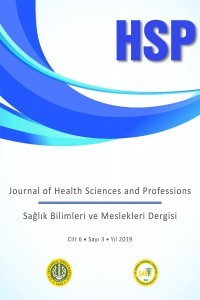Preterm Bebeği Olan Annelere Yapılan Taburculuk Eğitimi ve Ev Ziyaretlerinin Bebeğin Büyüme – Gelişmesine ve Annelerin Bakım Sorunlarını Çözme Becerileri Üzerine Etkisi
Amaç: Preterm bebeği olan annelere yapılan taburculuk eğitimi ve ev ziyaretlerinin bebeğin büyüme–gelişmesine ve annelerin bakım sorunlarını çözme becerilerine etkisini belirlemek amacıyla yapılmıştır. Gereç ve Yöntemler: Deneysel ve izlemsel tipteki çalışma, İstanbul’daki 3 hastanenin yenidoğan yoğun bakım ünitelerinde yatan basit rastgele örnekleme yöntemi ile belirlenen 63 anne (deney=31; kontrol=32) ve 75 preterm bebeği (deney=37; kontrol=38) ile gerçekleştirildi. Deney grubu annelere taburculuktan önce preterm bebeğin bakımına yönelik hazırlanan 3 oturum şeklinde bir eğitim programı düzenlendi. Taburculuktan sonra ise hem deney hem de kontrol grubuna toplam 4 kez ev ziyareti yapıldı. Ziyaret sırasında annelere “Sorun Çözme Becerileri Değerlendirme Formu (SÇBDF)” ve bebeklere ise “Ankara Gelişim Tarama Envanteri (AGTE)” uygulandı ve bebeğin antropometrik ölçümleri alınarak kaydedildi. Bulgular: Deney grubundaki bebeklerin AGTE’ten aldıkları genel gelişim puanı kontrol grubuna göre anlamlı düzeyde daha yüksek idi (p< 0.001). SÇBDF’den deney grubu annelerin 184.1 ± 17.4 puan, kontrol grubu annelerin 155.2 ± 22.0 puan aldığı ve farkın deney grubu lehine ileri düzeyde anlamlı olduğu saptandı (p< 0.001). Ancak her iki gruptaki bebeklerin antropometrik ölçümleri arasında anlamlı bir fark bulunmadı (p> 0.05). Sonuç: Preterm bebeği olan annelere yapılan taburculuk eğitiminin ve ev ziyaretlerinin bebeklerin gelişimleri ve annelerin sorun çözme becerileri üzerinde etkili olduğu saptandı.
Anahtar Kelimeler:
Büyüme-gelişme, ev ziyareti, hemşirelik, preterm
The Effect of Discharge Planning and Home Visits on Growth And Development of The Babies and Problem Solving Skills of Their Mothers.
Aim: It was perfomed to determine the effect of discharge planning and home visits on growth and development of the babies and problem solving skills of their mothers. Material and Method: The experimental type study consisted of 63 mothers (experiment=31;control=32) and 75 preterm babies (experiment=37 ;control=38) determined by simple random sampling method in the Neonatal Intensive Care Units of 3 hospitals in Istanbul. The experimental group had a 3-session training program for mothers of preterm babies before their discharge. After the discharge, a total of 4 visits were made to both the experimental group and the control group. During the visit, to Mothers “Problem Solving Skills Assesment Questionare: How To Deal with Problems Regarding Care of My Baby (SÇBDF)” and to infants “Ankara Developmental Screening Inventory (AGTE)” were applied and their anthropometric measurements were taken and recorded. Results: The general development score received from AGTE of the babies in the experimental group was significantly higher than the control group (p< 0.001). It was found that the score received from SCBDF were 184.1 ± 17.4 points for the experimental group and 155.2 ± 22.0 points for the control group, and the difference was found to be highly significant for the experimental group (p<0.001). However, there was no significant difference between the anthropometric measurements of the infants in both groups (p> 0.05). Conclusion: Discharge training and home visits to mothers with preterm infants were found to be influential on infant development and mothers' problem-solving skills.
Keywords:
Growth and development home visits, nursing, preterm, discharge planning,
___
- 1. Boykova M,Kenner C. Transition from hospital to home for parents of preterm infants. The Journal of Perinatal & Neonatal Nursing 2012; 26 (1):81-87.
- ISSN: 2148-7588
- Başlangıç: 2014
- Yayıncı: İstanbul Üniversitesi-Cerrahpaşa
Sayıdaki Diğer Makaleler
Öğrencilerin Rahatta (Konforda) Bozulma Hemşirelik Tanısını Belirleme Durumlarının Saptanması
Nilay ORKUN, Şebnem ÇINAR YÜCEL
Gebelikte Maruz Kalınan İyonize Radyasyon
Sağlık Bilimleri ve Meslekleri Dergisi Yıl 2017 Cilt 4 Sayı 3
Sağlık Bilimleri Ve Meslekleri Dergisi Yıl 2017 Sayı 3 HSP
Gebelikte Romatoid Artrit ve Yönetimi
Ayşe ÇİL AKINCI, Fatma COŞAR ÇETİN
Öğretim Üyesinin Etik Sorumluluğu
Ebru KAYA MUTLU, Arzu RAZAK ÖZDİNÇLER, Tansu BİRİNCİ
Duygu SÖNMEZ DÜZKAYA, Gülçin BOZKURT, Tülay YAKUT
İnfantil Kolikli Bebekleri Etkileyen Faktörler
Gülzade UYSAL, Duygu SÖNMEZ DÜZKAYA, Gülçin BOZKURT
Çocukluk Dönemi Engeliliğinde Habilitasyon Uygulamaları ve Hemşirelerin Rolleri
